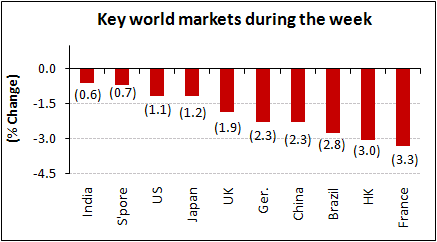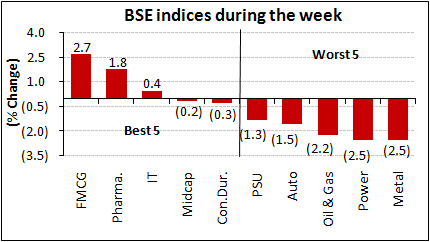- Home
- Todays Market
- Indian Stock Market News March 24, 2012
Markets capitulate on global concerns Sat, 24 Mar RoundUp
The world stock markets ended the week on a sour note. The US stock markets were down 1.1% during the week due to disappointing housing data. New home sales fell for the second straight month in February by 1.6% to 313,000. Fall in volumes suggested that the recovery in the US housing market may take longer than expected. Further, the factory data from Europe and China was also disappointing leading to a broader fall in global markets.
The Indian stock markets were down 0.6% during the week. The post-budget trading session was filled with high volatility as markets see-sawed during the week. This was the fifth consecutive weekly loss for the markets as uncertainties still linger as to when the central bank would cut interest rates. Higher borrowing plans for the next fiscal have also worried markets.
Amongst the other world markets, Singapore was down by 0.7% while Japan was down 1.2% during the week. France was the biggest loser registering losses of 3.3% during the week.
 |
| Source: Yahoo Finance |
Sectoral indices registered a mixed performance during the week. FMCG was up 2.7% during the week followed by pharma which was up 1.8%. However, the metals and power pack was down 2.5% during the week.
 |
| Source: BSE |
Let us now take a look at key developments during the week. It is believed that the Government may get bogged down by yet another corruption scandal. As per a leaked draft from the Comptroller and Auditor General's (CAG) office, the country might have lost upto US$ 210 bn in revenue by selling coal deposits too cheaply. The Government has been criticized for allocating 155 valuable coalfields to about 100 private and some state-run miners instead of auctioning them off to the highest bidder.
However, soon after the publication of the leaked draft CAG clarified that the observations regarding the allotment of coal blocks are highly misleading. In fact, CAG is not even of the opinion that the allotment would have necessarily meant an equal loss to the exchequer. Meanwhile, the coal minister has clarified that the government is almost ready to auction coal blocks through competitive bidding and the guidelines for this are likely in 2-4 months.
The subscriber base for the mobile sector in India has grown multifold over the past few years. However, there has been no new spectrum issued since 2008. As a result, mobile operators have demanded that the government should auction the entire available spectrum in the next round of spectrum auctions. This should include the spectrum available after the 2G license cancellation as well as the additional spectrum made free by the defence. As per incumbent Bharti Airtel, additional spectrum is required to improve the quality of voice as well as data services provided to the telecom subscribers. Bharti has stated that there is no reason to reserve spectrum. This is because there exist's sufficient demand in the market and operators are willing to pay the market determined prices for the same. Though the operators differ on what should be the ideal reserve price for the auction, they all agree that auctioning the entire available spectrum would make more sense as it would be beneficial for the consumers in the long run.
The merger of Mahindra Satyam with Tech Mahindra has been given approval by the boards of the two companies. The exchange ratio for the merger has been fixed at 2:17 which means that a shareholder holding 17 shares of face value of Rs 2 each of Mahindra Satyam will be entitled to receive two shares of face value of Rs 10 each of Tech Mahindra. The merger is effective from April 2011. As per Tech Mahindra, the merger will result in combined revenue of about US$ 2.4 bn and more than 350 clients across different geographies and industrial sectors. Tech Mahindra has been feeling the pain inflicted by the retendering of contracts by its largest client British Telecom (BT). The revenues from this account have been on the decline for the last two quarters. The good sign during the December 2011 quarter was that the company continued its growth momentum in the business from non-BT accounts as well as from the rest of the world markets
With the Finance Minister announcing a hike in basic excise duty from 10% to 12%, Tata Motors has decided to hike prices with the aim of passing on the impact of the rise in excise. In passenger cars, the increase will vary between Rs 2,000 and Rs 8,000 depending upon various models. Under this the company sells small car Nano, hatchback Indica and sedan Indigo. In case of utility vehicles like Safari, Aria and Sumo, the hike will be from Rs 8,000 to Rs 35,000. The company's commercial vehicles will also witness a rise in prices. It must be noted that auto companies have had a difficult fiscal so far what with the rise in interest rates and fuel prices which dampened demand. High commodity costs also took its toll in the form of rise in input costs which dented operating margins. Hence, the companies have been left with no option but to pass on the excise duty hike to customers.
| Company | 16-Mar-12 | 23-Mar-12 | Change | 52-wk High/Low |
| Top gainers during the week (BSE-A Group) | ||||
| Tech Mahindra | 623 | 737 | 18.4% | 787/540 |
| Century Textiles | 313 | 359 | 14.7% | 389/218 |
| India Cements | 99 | 112 | 13.2% | 114/64 |
| Madras Cements | 143 | 154 | 7.7% | 153/81 |
| ITC Ltd | 208 | 222 | 6.9% | 224/170 |
| Top losers during the week (BSE-A Group) | ||||
| NCC Ltd | 58 | 50 | -13.6% | 117/32 |
| GTL Infra | 12 | 11 | -12.2% | 39/7 |
| KSK Energy | 69 | 60 | -12.0% | 123/35 |
| Aban Offshore | 495 | 437 | -11.8% | 707/332 |
| Shree Renuka Sugars | 37 | 33 | -11.5% | 77/24 |
We will now discuss the other important corporate/economic events that took place over the week.
In order to clamp unprecedented expansion of gold loans by Non Banking Finance Companies (NBFCs) RBI came out with a revised set of guidelines during the week. As per the new guidelines, the loan to value ratio (LTV) has been pegged at 60%. Right now, most of the gold loan companies have the LTV ratio above 60%. Reduction of the LTV will reduce loan growth and thereby interest income of NBFC's. Reserve Bank Of India (RBI) has also mandated that these companies maintain a tier 1 capital of 12%. Thus, some of these companies may also have to raise capital in the future in order to comply with RBI norms.
With elections culminating in the five states petrol prices are set to rise soon. It may be noted that while the petrol prices are de-regulated, OMC's were mandated by the government to not to raise the same until elections. Apart from petrol price revision, government is also contemplating to review diesel, kerosene and cooking gas prices. If the fuel prices are revised the inflationary scenario is expected to worsen in the near future.
The post budget week ended with high volatility. While the Union Budget seemed to be a muted affair as far as reforms were concerned it must be noted that it is the coalition politics that is hurting reforms process. And unless we find a resolution to this issue, the reform agenda will continue to remain on the backburner.
For information on how to pick stocks that have the potential to deliver big returns, download our special report now!
Read the latest Market Commentary


Equitymaster requests your view! Post a comment on "Markets capitulate on global concerns". Click here!
Comments are moderated by Equitymaster, in accordance with the Terms of Use, and may not appear
on this article until they have been reviewed and deemed appropriate for posting.
In the meantime, you may want to share this article with your friends!